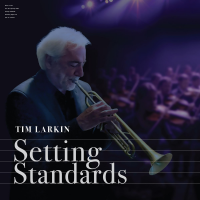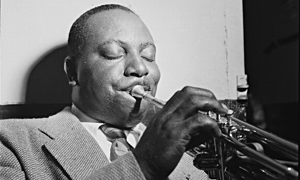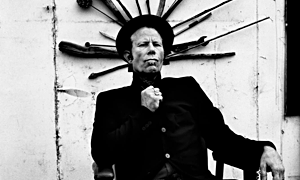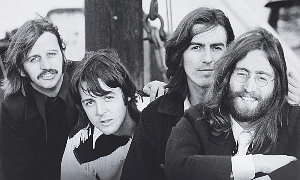Home » Jazz Articles » Book Review » Reminiscing in Tempo: A Portrait of Duke Ellington
Reminiscing in Tempo: A Portrait of Duke Ellington
 By Stuart Nicholson
By Stuart NicholsonNortheastern University Press 1999
ISBN-55553-380-8
"Reminiscing in Tempo" is not the definitive biography we might have expected in Ellington's centenary, but it's a valuable book nonetheless.
Nicholson, the author of books on Billie Holiday and Ella Fitzgerald, has taken the oral biography route. It can be argued that this is easier or lazier than digging into Ellington's life in the context of a thoughtful narrative, but there is a lot of value to these strung together quotes from Ellington and the people who worked and lived with him.
For one thing, we get a real sense of Ellington's voice and personality, and not just the charming, elegant one we so frequently encounter in interview snippets and stage announcements. Here the voice is sometimes rough, bawdy and occasionally angry. I won't say I blushed, but the first few times I encountered this side of Ellington in the quotes, I was a bit shocked. No, a person can't be that slick and sophisticated all the time—some ideal gentleman the rest of us could never measure up to.
Duke's humanity comes through in the quotes from others, too, particularly when his sister, Ruth, and son, Mercer, have their say. We learn that Ellington was a less-than-ideal partner to the (many) women in his life and barely a father at all. He could be stingy with his band members. He took credit for songs he didn't fully write. But there is balance to all this criticism. In the same breath that bandsmen complain about their salaries and rough lives on the road, they reminisce about how much fun it was, about what an honor it was to play with Ellington. About what a great man he was.
For example, here's clarinetist Barney Bigard: "That's the only thing I didn't like about Duke. He never gave the boys in the band the credit they deserved. Like Otto Hardwick and Lawrence Brown wrote 'Sophisticated Lady' but their names are not on it. It wouldn't have cost him nothing to credit them—he was a genius." And, though slighted, Brown himself barely seems to mind when he comments on the same tune: "That's one everybody jumps in and helps out, but mainly I had the theme which I played all the time which is the first eight bars. And Otto Hardwick played the release and I went back to the first eight bars. That was the basic tune...You never know when you have a coming number on your hands. We were just doing something we wanted to do."
As surrounded as Ellington was by these close associates, some of whom played in his band for decades, it makes perfect sense that Nicholson took the approach he did. It's a joy to hear all these people, and Duke himself, talk. There's the occasional dud quote, or one that breaks up the flow. But, by and large, it's fascinating and colorful reading.
In addition to all the quotes, Nicholson includes excerpts from Ellington's FBI file, which show him to have been far more involved than previously believed in the pursuit of civil rights. Ellington said many times that he preferred to let his music speak for him, and "Black, Brown and Beige," "Harlem," "My People" and many other pieces powerfully portray both the beautiful and painful aspects of American black culture. Of all the emotions in the music, hopefulness and pride are paramount. The FBI documents bear this out: There is no evidence of Ellington making political speeches or denouncing anyone. But they show that on many occasions he donated funds to and performed gratis for causes he believed in. The excerpts also testify to the paranoia of the times. One of the allegedly "communist front" organizations Ellington helped sponsor, in 1942, was the "Artists' Front to Win the War." Now there's a subversive cause for you.
The book also includes reproductions of posters promoting Ellington performances and films, articles and biographical materials from his official press kit of the 1930s, and a fine discography. Taken together with all the quotes and a nice batch of photos, the result is a big, thick scrapbook to remember Ellington by in his centennial year.
It would be wonderful if a future writer could take this wealth of information, lend it greater shape and analysis, and put together the fine biography Ellington deserves. But in the meantime, I'll happily make do with this.
Tags
PREVIOUS / NEXT
Support All About Jazz
 All About Jazz has been a pillar of jazz since 1995, championing it as an art form and, more importantly, supporting the musicians who make it. Our enduring commitment has made "AAJ" one of the most culturally important websites of its kind, read by hundreds of thousands of fans, musicians and industry figures every month.
All About Jazz has been a pillar of jazz since 1995, championing it as an art form and, more importantly, supporting the musicians who make it. Our enduring commitment has made "AAJ" one of the most culturally important websites of its kind, read by hundreds of thousands of fans, musicians and industry figures every month.

























